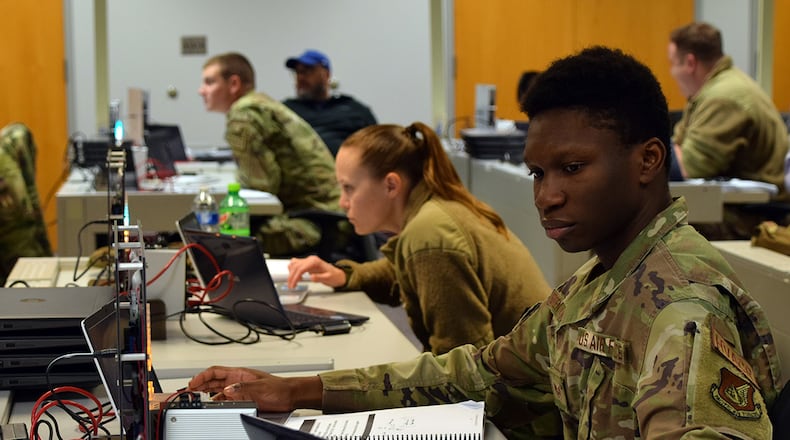Instructors use hands-on exercises to demonstrate the impact of cyber-attacks against control systems and introduce students to ladder logic, human machine interfaces and basic networking principles that emulate a real-world control system. Students apply their knowledge during a capstone exercise that illustrates how malicious code can create a physical effect on control systems.
“Cyber security is an important part of every discipline, but especially the CE community, because a lot of the services they offer to the Air Force are fundamental to every mission set; things like power, managing water, and environmental controls to run the buildings,” said Billy Rios, a course instructor and co-founder of QED Secure Solutions. “Understanding how cybersecurity risks and attacks work against those types of systems and how to defend against that is pretty important.”
“We’re building a cadre of cyber-aware NCOs that are receiving a rare blend that converges information technology with operational technology,” said Nicholas Kulesza, a course director in the CE School. “These students are learning from some of the top cyber experts in this field and it’s rewarding to know they’re going to take that experience back to their home units.”
Staff Sgt. Isaiah Green Cardwell, an information systems security manager for the 35th CE Squadron at Misawa Air Base, Japan, appreciated the new experience he gained with coding and working on a Linux machine.
“This is definitely useful for technicians who need this type of experience because it isn’t something that you typically do every day,” said Green Cardwell.
“The class is really hands-on. Normally you don’t get to play around with the systems that you work with because they are supporting real world operations and missions.” said Rios. “Having a laboratory environment where people can go hands-on and see how a cyberattack works and how cyber defense works without disrupting an ongoing mission has been the most eye-opening piece for the students.”
Master Sgt. Warner Houston, an HVAC civil engineer currently serving as the Airman Leadership School commandant at Hill Air Force Base, Utah, served as a student mentor for the class. “It’s vital that we provide all the new people who are directly working with this equipment an overall awareness and ensure they are familiar with cyber issues potential impacts,” said Houston.
Beginning in fiscal 2023, the CE School will offer the advanced control systems cybersecurity course regularly to seven-level technicians from electrical, power production, HVAC/R, water and fuels Air Force Specialty Codes.
The Civil Engineer School provides technical and management oriented professional continuing education courses to more than 12,500 students a year in a variety of subject areas to prepare officer, enlisted, and civilian professionals to be more efficient and effective in current and future assignments in the CE fields.
The school provides technical engineering, environmental, asset and engineering management, and expeditionary-focused instruction. The school also provides the initial skills training for all newly commissioned CE officers. Visit www.afit.edu/CE for more information.
About the Author
